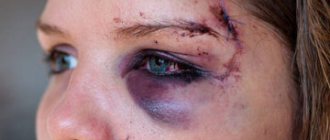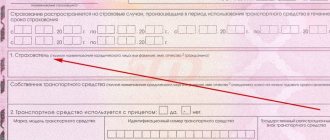The legislation of the Russian Federation provides for liability for battery. Battery is understood as the commission of violent acts against another person, which resulted in the infliction of physical pain without short-term health impairment or minor loss of health (Article 116 of the Criminal Code of the Russian Federation). Battery may be classified as inflicted by feet, hands, or foreign objects. The main sign of beating is physical pain of the victim.
Situations in which beatings occur are considered intentional and provoked. In order to bring the perpetrator to justice, it is necessary to provide the competent authorities with evidence confirming the fact of violence on his part. We are talking, first of all, about removing the beatings. The procedure involves undergoing a medical examination or receiving assistance from medical specialists, who, after providing it, must make a conclusion confirming the fact of causing pain and bodily harm to the victim.
How to remove beatings
Beatings are treated in emergency rooms, emergency medical services, as well as in private clinics.
- Emergency room. In government institutions, beatings are removed free of charge. The corresponding certificate is issued by a traumatologist or surgeon. Victims can apply on their own or through a referral from the police.
- Bureau of Forensic Medicine (BSME). Batteries are removed free of charge based on a referral issued by law enforcement agencies. Experts measure the injuries received, describe the nature of their infliction, appearance and severity.
- Accredited private expert institutions. Citizens can go to a paid clinic, where they are examined and made an opinion by a private expert.
In case of hospitalization, the injuries received are recorded by hospital staff and reflected in medical documents.
Is it possible to remove a beating without a statement?
The victim can remove the beating himself, without contacting the police. To do this, it is recommended to go to the emergency room. Based on the results of the inspection, a state-issued certificate is issued, which indicates all the damage caused to the victim, as well as the date and time of the complaint. The certificate is signed by the doctor and affixed with his stamp.
Citizens should know that if they suspect the violent nature of the identified injuries, employees of emergency rooms, hospitals and clinics are required to report these facts to the police department in whose service territory the medical institution is located. The victim may refuse to write a statement, and in this case the police will stop further verification, since the acts specified in Art. 116 of the Criminal Code of the Russian Federation are the subject of a private prosecution and are not considered without the victim’s request.
What is the threat of beating the perpetrator?
If the beating person committed an offense for the first time, and the victim did not experience significant damage to his health (for example, he did not go on sick leave because he was able to continue working), then the perpetrator will be brought to administrative responsibility under Art. 6.1.1 Code of Administrative Offenses of the Russian Federation.
Possible punishment:
- a fine of 5-30 thousand rubles;
- arrest for 10-15 days;
- compulsory community service for 60-120 hours.
If the batterer causes significant harm to the health of the victim, then he faces criminal punishment. Liability is established under Articles 111-116 of the Criminal Code of the Russian Federation.
Thus, intentional infliction of serious harm to health, which entailed loss of vision, hearing or another organ, mental disorder, long-term disability, threatens the perpetrator with imprisonment for a period of up to 8 years under Art. 111 of the Criminal Code of the Russian Federation.
Causing severe or moderate harm to health in the heat of passion under Art. 113 of the Criminal Code of the Russian Federation entails correctional/forced labor, deprivation or restriction of freedom for a period of up to 2 years.
Intentional infliction of serious harm to the health of the victim by exceeding the limits of self-defense entails forced labor/correctional labor, imprisonment or restriction of freedom for a period of up to 1 year.
Beatings under Art. 116 of the Criminal Code of the Russian Federation is punishable by compulsory, corrective or forced labor, arrest for up to 6 years or imprisonment for up to 2 years.
Statement to the police
The statement of beatings can be written in any form, by hand, or provided in the form of printed text. The document is submitted to the territorial police department at the place where the beating took place. Citizens have the right to submit an application to the police at their place of residence, but its consideration will be carried out precisely in the body in whose service territory the events specified in the document took place (Article 152 of the Code of Criminal Procedure of the Russian Federation).
The statement must describe in detail the fact of the beating, indicate the date of the event, time, place and other information relevant to the case, including information about the person (persons) who committed the offense. If for some reason the victim cannot draw up a document on his own, it can be written by a representative of the duty shift of the police department where the applicant applied.
In the upper right corner the name of the organization to which the application is being submitted is indicated, as well as the surname and initials of the manager. The applicant's details and contact information are shown below. The following describes in detail the circumstances in which the victim became a victim of beating and bodily harm. The document is signed by the applicant indicating the current date.
Deadlines for submission and review
It is advisable to submit an application for beatings no later than 1-3 days after the commission of the offense. This is due to the medical component. During the first few days after the beating, the resulting injuries, abrasions and bruises do not heal. Next, the recovery process begins, the hematomas resolve, and the skin is restored. Therefore, it becomes almost impossible to verify the authenticity of injuries.
The best option is to first undergo a medical examination and then file a complaint with the police. According to Art. 78 of the Criminal Code of the Russian Federation, the limitation period for minor crimes is 2 years after their commission.
As for the timing of consideration, the official who will be entrusted with the inspection is obliged to conduct a pre-investigation inspection within three days from the date of registration of the application. If necessary, the period for consideration of the application can be extended to 10 days (Article 144 of the Code of Criminal Procedure of the Russian Federation).
We recommend reading: How to write a complaint to the police
What measures will be taken
Based on the verification, one of the following decisions is made:
- On the initiation of a criminal case under Art. 116 of the Criminal Code of the Russian Federation (Article 164 of the Code of Criminal Procedure of the Russian Federation).
- On refusal to initiate a criminal case (Article 148 of the Code of Criminal Procedure of the Russian Federation).
- On the transfer of inspection materials to the competent authority in accordance with Article 151 of the Code of Criminal Procedure.
The applicant is notified of the decision in writing. In practice, it is recommended to independently find out about the fate of the application by telephone or by visiting the police department after the deadline for consideration has expired. A written response may take several weeks to reach the applicant.
Sample application
Here you can see a sample statement to the police, using which it will not be difficult to write a statement yourself.
We recommend that you describe the events in your statement in as much detail as possible, as details are a contributing factor to the police's resolution of the case. To a greater extent, this applies to those cases when the offender is a complete stranger to you.
Download
Sample statement to the police about beatings (.doc)
Is it possible to withdraw a statement from the police?
Battery falls under the category of crimes of private prosecution. The applicant may withdraw the application he submitted against the offender in cases where the conflict between the parties has been resolved and the applicant has no claims against the entity that caused him physical pain. The official conducting the pre-investigation check accepts a counter-statement from the victim, where he asks to terminate the consideration of the case in connection with the reconciliation of the parties. Based on this document, a decision is made to refuse to initiate a criminal case. The deadline for filing a counter-statement is up to 10 days from the moment the fact of beating is registered with the police.
There is no liability for the victim except in cases where the applicant knowingly made a false report of a crime, i.e. on the fact of slander against the defendant. A person who makes a false complaint to the police may be prosecuted under Art. 128 of the Criminal Code of the Russian Federation “Slander”.
Algorithm for the victim’s actions after beating
After beating, you must go to the clinic at your place of residence or call an ambulance, depending on the severity of the injuries. The victim must document the fact of beating for further development of the case (read how to document beatings here). At the clinic, doctors will examine wounds and bruises and issue a special medical certificate, with which you can contact the police.
Additional evidence of beatings may also include witness statements, photographs, video and audio materials.
A statement is filed at the police department with a request to initiate a criminal case against the person or group of people who committed the beating. A medical certificate confirming the act of beating, as well as other evidence, if any, is attached to the application. Witness testimony must be recorded in writing.
The question often arises: should you go to the police after a beating or go straight to court? There are several reasons to contact the police. Firstly, the attacker may be unknown to the victim, and then the police take measures to identify the criminal (viewing CCTV cameras, interviewing witnesses, etc.). Secondly, initially the victim’s injuries may be classified as beatings, but later serious consequences may develop. The injuries will be reclassified as serious, and the case will be reclassified from a private accusation to a public one. And then the investigative authorities draw up an indictment and submit it to the court.
Application to court
Victims should know that criminal liability under Art. 116 of the Criminal Code of the Russian Federation occurs if beatings are committed against loved ones - children, spouses, etc. When the beating took place as a result of a gross violation of public order (hooliganism). Or the physical pain was caused by a person who had previously been brought to administrative responsibility for similar facts, or the perpetrator acted out of motives of racial or religious hatred.
In all other cases, criminal liability for bodily injuries that do not result in short-term health problems does not arise. The victim has the right to file a claim in court for compensation for moral or material damage (if any). A claim in court is accepted if the applicant knows information about the defendant and if the plaintiff has evidence - witnesses to the incident and a medical examination report.
We recommend reading: How to write a complaint to the court
Procedure for going to court
The statement of claim is filed with the district court at the place of residence (registration) of the defendant (Article 32 of the Code of Criminal Procedure of the Russian Federation). The document is drawn up according to the sample within the framework of the norms of paragraph 5 of Art. 318 Code of Criminal Procedure of the Russian Federation. The applicant must indicate his personal information and the personal information of the defendant, describe in detail the conflict and all the circumstances surrounding it, write the date of the beating and the most accurate time.
In addition, the statement displays a list of persons who can testify to the stated facts and a description of the consequences of the beating with reference to the forensic medical examination report. The claim is signed, the current date is indicated and an appendix is drawn up with a list of documents attached to the case (Part 6 of Article 318 of the Code of Criminal Procedure of the Russian Federation). The application can be made by the victim himself or his representative. As for minors, the claim is prepared by parents, guardians or authorized officials.
NTVP "Kedr - Consultant"
LLC "NTVP "Kedr - Consultant" » Services » Legal consultations » General civil issues » How and to whom to correctly draw up an application for criminal prosecution for battery and hooliganism
On 06/02/2014, applicant P., driving his Renault Logan car outside the city in SNT “ХХХ”, in accordance with the traffic rules, overtook a Daewoo Matiz car on the left side. Having stopped at SNT "XXX" he heard someone honking from behind him. Turning around, he saw that he was being pursued by a Daewoo Matiz car, which he had previously overtaken. A woman jumped out of the car and immediately started screaming on why he dared to overtake her, because. because of this, she was forced to drive in a strip of dust. After this, the woman began hitting the windshield of the Renault Logan car with her hands. P., getting out of the car, tried to explain to her that she did not have the right to touch other people’s property, much less spoil it. The man tried to hold her back with his hands, but the woman hit him in the face several times and scratched his forehead with her nails. After that, a second woman jumped out of the Daewoo Matiz car and began hitting P. with a milk carton, which broke due to the blows and spilled all over the man’s clothes. Then the woman threw a cobblestone at P., causing a superficial wound to appear on the victim’s left cheek. After this, both women inflicted numerous beatings on the man’s back, chest and arms, causing P. to have bruises and abrasions in the above-mentioned places. Subsequently it turned out that in the car there were gr. T.T.A., born in 1976 and her mother gr. T.T.N., born 1955 This incident was witnessed by the chairman of SNT “XXX” B.G.Yu. and the owner of the SNT “XXX” plot R.K.M.
After the incident, P. called the police to the scene, who recorded beatings, as well as damage to the windshield of the car. Having written a statement to the police regarding the fact of the beating and a statement to attest to the fact of damage to the windshield of the car, the victim went to the traumatology department and the forensic medical examination department, where his injuries were recorded.
The police issued a resolution dated June 11, 2014, refusing to initiate criminal proceedings against P. due to the lack of corpus delicti in accordance with paragraph 2 of Part 1 of Art. 24 of the Code of Criminal Procedure of the Russian Federation and invited the victim to contact the magistrate with an application to initiate a criminal case as a private prosecution against gr. T.T.A. and T.T.N. according to Art. 116 part 1 of the Criminal Code of the Russian Federation.
P. appealed to the magistrate (full name, district, precinct) of Izhevsk with a statement to initiate a criminal case as a private prosecution against T.T.A. and T.T.N. for intentional battery, as well as the recovery of moral damages in the amount of 10,000 rubles.
By a resolution of the magistrate (full name, district, site) of Izhevsk dated October 16, 2014, the application was returned to P. due to the fact that the victim’s application does not contain a copy of the application for the person held accountable, which is a violation of Part 5 of Art. .318 Code of Criminal Procedure of the Russian Federation.
Having eliminated the shortcomings of the application, P. again filed an application with the court.
By resolution of the magistrate (full name, district, site) of Izhevsk dated October 27, 2014, P.V. Povarnitsyn. The application was refused to be accepted for processing due to the fact that the application did not indicate the place where the crime was committed, and there was no connection to the house, which is a violation of Parts 5 and 6 of Article 318 of the Code of Criminal Procedure of the Russian Federation.
In an oral conversation, the judge informed P. that the victim needed to file an application not under Part 1 of Art. 116 of the Criminal Code of the Russian Federation, and according to Part 2 of Art. 116 of the Criminal Code of the Russian Federation for its subsequent transfer to the police, since the specifics of private prosecution cases are quite difficult, because in this case, the victim himself will have to support the accusation.
Doubting his legal literacy and wanting to fairly punish the perpetrators, applicant P. sought legal help.
The applicant's questions: How and to whose address should one correctly draw up an application for criminal prosecution for battery and hooliganism?
Do law enforcement agencies act lawfully in refusing to initiate criminal proceedings against a victim, and what method of bringing criminal charges in this case is the most preferable?
Lawyer's answer.
As a result of the conversation, the circumstances and documents in the case were clarified, in particular, whether there were witnesses to this incident, whether an appeal was filed against the decision of the Magistrate dated October 27, 2014, a copy of the application to initiate a criminal case as a private prosecution with attachments; copies of decisions of the magistrate dated 10/16/2014, dated 10/27/2014
According to Part 1 of Art. 20 of the Code of Criminal Procedure of the Russian Federation, depending on the nature and severity of the crime committed, criminal prosecution, including charges in court, is carried out in public, private-public and private. According to Part 2 of Art. 20 of the Code of Criminal Procedure of the Russian Federation, criminal cases of crimes under Art. 115 part one, 116 part one, 128.1 part one of the Criminal Code of the Russian Federation are considered criminal cases of private prosecution, initiated only at the request of the victim, his legal representative, with the exception of cases when this crime was committed against a person who, by virtue of being dependent or helpless condition or for other reasons cannot protect their rights and legitimate interests. Thus, the crime provided for in Part 1 of Article 116 of the Criminal Code of the Russian Federation refers to cases of private prosecution, in which a criminal case is initiated only at the request of the victim or his legal representative.
According to Part 1 of Art. 21 of the Code of Criminal Procedure of the Russian Federation, criminal prosecution on behalf of the state in criminal cases of public and private-public accusations is carried out by a prosecutor, as well as an investigator and an interrogating officer.
From this we can conclude that the provisions of Part 2 of Art. 116 of the Criminal Code of the Russian Federation relate to cases of private prosecution, in which the investigation should be carried out by law enforcement agencies, and not by the victim himself. In addition, the injured P. is not one of those persons who, due to a dependent or helpless state or for other reasons, cannot protect their rights and legitimate interests. Article 115 of the Criminal Code of the Russian Federation talks about the intentional infliction of minor harm to health, causing a short-term health disorder or a minor permanent loss of general ability to work. However, a short-term health disorder or a slight permanent loss of general ability to work is usually understood as being in a medical institution, a slight loss of limb function.
Since P. did not have a short-term lack of health or its permanent loss, the police authorities quite rightly classified this crime as a case of private prosecution in accordance with Part 1 of Art. 116 of the Criminal Code of the Russian Federation, according to which a criminal case is initiated only at the request of the victim.
According to paragraph 1 of Article 116 of the Criminal Code of the Russian Federation, beating or committing other violent acts that caused physical pain, but did not entail the consequences specified in Art. 115 of the Criminal Code of the Russian Federation.
However, the question arises why the police classified this crime under Part 1 of Art. 116 of the Criminal Code of the Russian Federation, and not under Part 2 of Art. 116 of the Criminal Code of the Russian Federation - beatings with hooligan motives and thereby, on completely legal grounds, issued a decision to refuse to initiate a criminal case in accordance with paragraph 2 of Part 1 of Art. 24 Code of Criminal Procedure of the Russian Federation? This circumstance forced P. to turn to the magistrate with a statement to initiate a criminal case as a private prosecution.
In the lawyer’s opinion, the police did not take into account the fact that P. was not familiar with T.T.A. and T.T.N. However, beatings for hooligan reasons have a broader focus; in particular, they are associated with a violation of public order, expressed in clear disrespect for society and its social foundations. The decisive factor here is the direction of intent. T.T.A. and T.T.N. committed a crime against a specific driver who they thought had illegally overtaken, and not against any passerby. In this situation, the offenders did not show obvious disrespect for society by their act, as would be the case if the victim was clearly a stranger.
From the above it follows that the actions of the police authorities, who refused P. to initiate a criminal case under Art. clause 2, part 1, art. 24 of the Code of Criminal Procedure of the Russian Federation and qualifying this crime under Part 1 of Art. 116 of the Criminal Code of the Russian Federation are lawful, since Part 1 of Art. 116 of the Criminal Code of the Russian Federation refers to criminal cases of private prosecution, initiated only at the request of the victim or his legal representative. In this case, the magistrate’s point of view is that P., in order to initiate a criminal case, must send an application to the magistrate in accordance with Part 2 of Art. 116 of the Criminal Code of the Russian Federation for its subsequent transfer to the police is untenable. If these conditions are met, the police will again refuse P. to initiate a criminal case under paragraph 2 of Part 1 of Art. 24 Code of Criminal Procedure of the Russian Federation.
In this situation, P. needed to correctly draw up a statement in compliance with the requirements of Art. 318 Code of Criminal Procedure of the Russian Federation.
After checking P.’s application, the lawyer proposed making the following changes:
— indicate your passport details in full in accordance with clause 3.1, part 4, art. 318 Code of Criminal Procedure of the Russian Federation;
- add references to Part 1 of Art. to the text of the application. 116 of the Criminal Code of the Russian Federation and Art. 147 of the Code of Criminal Procedure of the Russian Federation, which the victim did not indicate in the statement;
- in the text of the application, instead of the words: “I ask you to initiate a criminal case and bring citizen T.T.A to criminal responsibility. ..." write: "I ask you to accept the case for proceedings and involve T.T.A. and T.T.N. to criminal liability for committing a crime under Part 1 of Art. 116 of the Criminal Code of the Russian Federation." The applicant was explained his right to re-apply to the magistrate within the 2-year statute of limitations, as well as the consequences of filing an application after the expiration of the statute of limitations, since in this case the court would quite reasonably rule on the refusal to accept the application for proceedings on based on clause 3, part 1, art. 24 of the Code of Criminal Procedure of the Russian Federation due to the expiration of the period for bringing to criminal responsibility.
In case of another refusal, it must be appealed to the district court of Izhevsk through a magistrate within 10 days from the date of issuance.
Thus, the police lawfully refused P. to initiate a criminal case under paragraph 2 of Part 1 of Art. 24 of the Code of Criminal Procedure of the Russian Federation and suggested that the victim contact the magistrate with a statement to initiate a criminal case as a private prosecution in accordance with Part 1 of Art. 116 of the Criminal Code of the Russian Federation. The judge's arguments about the possibility of reclassifying this case from private to public by submitting an application to the magistrate to initiate a criminal case under Part 2 of Art. 116 of the Criminal Code of the Russian Federation for subsequent investigation of the case by the police are untenable, since the qualifying features determine this crime precisely under Part 1 of Art. 116 of the Criminal Code of the Russian Federation. Since by Part 1 of Art. 116 of the Criminal Code of the Russian Federation refers to criminal cases of only private prosecution; they are initiated only at the request of the victim or his legal representative. The police have no grounds to initiate a criminal case under this article. To attract guilty persons, the Code of Criminal Procedure of the Russian Federation provides only for filing an application to initiate a criminal case as a private prosecution. In this case, a preliminary investigation is not carried out, and P. will be forced to independently prove both the fact of committing a crime and the guilt of a specific person, bypassing the mandatory procedural stages of pre-trial proceedings in other situations (in cases of private-public and public prosecution). Thus, in accordance with the current legislation, the magistrate’s court (district, site) of the city of Izhevsk UR is obliged to accept the application of the PV. and bring the perpetrators to criminal liability under Part 1 of Art. 116 of the Criminal Code of the Russian Federation.
Skvortsov Alexey Valerievich, consultant of the legal department of the FSS for sustainable development, 8-950-175-32-59
Consultation given in November 2014.
How to prove beatings if there are no witnesses?
If you were beaten and traces of them remain, then you must immediately seek medical help so that the fact of the presence of traces of beatings is recorded.
After a crime has been committed against the victim, he should tell about what happened to as many people as possible who will be indirect witnesses to what happened. Also, when they meet, witnesses can see the consequences of the incident between the victim and the accused.
You should contact the police as soon as possible and testify in great detail about the beatings inflicted.
If the incident was recorded by CCTV cameras, you must request video footage from the cameras. The individual will most likely not be given the recording, so you should ask the investigator to make a request accordingly.
What to do if a statement has been filed against you?
What a person who has been reported to the police for beatings should do depends on the following circumstances:
- If he really beat the applicant and this can be confirmed by witnesses, the best solution would be to admit guilt, which could subsequently become a mitigating circumstance;
Advice
You can try to negotiate with the applicant to resolve the situation peacefully by withdrawing the application. If he does this, no criminal case will be opened.
- If the applicant has fabricated charges, under no circumstances should you admit guilt or sign any documents . This will not only aggravate the situation, but will also make it virtually irreversible;
- If the reason for filing a complaint was minor beatings that were inflicted without intent and are of an isolated nature (there are only a couple of bruises on the victim’s body), the accused can challenge this charge;
- If the accused himself has suffered beatings, he has the right to file a counterclaim alleging beatings;
Compensation for damage to health
In addition to criminal and administrative liability, the victim of beatings has the right to recover damages to health from the culprit through civil law.
To receive such a penalty, the victim must remove the beatings and file a claim in court. If the victim estimates the damage to health to be worth up to 50,000 rubles, the claim should be filed in the magistrate’s court, if more, in the district court.
During the review process, in addition to the fact of assault, it will be necessary to prove the amount of damage.
Claims for compensation for personal injury are not subject to statute of limitations rules. A person may submit such an application without any time limit. However, if the claim is filed after three years from the date of the event, the damage is compensated only for the three years preceding the filing of the claim.
What is considered battery?
It is not possible to file a report of battery in all cases. For an application to be accepted, the following factors must be satisfied:
- The beating must be visible . According to Article 116 of the Criminal Code of the Russian Federation, abrasions, wounds, bruises, scratches, i.e. are considered battery. mild physical harm;
- Intent has been proven . In order for a criminal case to be opened after filing an application, it is necessary to prove that the offender beat the victim intentionally, wanting it, and not accidentally, for example, by simply pushing her to the side;
- Repeated acts of violence of a certain nature , i.e. the rapist must hit the victim not once, but at least several times;
Application deadlines
The deadline for submitting documents must be within two years, since the offense in question relates to crimes of minor gravity. However, it must be taken into account that the longer the incident occurs, the more difficult it is to prove the fact of illegal actions. The distinction between beatings and other types of violent acts is based on the degree of harm to health. Even minor harm entails loss of ability to work for six days or more, so only damage within this period can be considered battery. Therefore, if a lot of time has passed since the use of physical force (for example, a week or two), the medical examination data may no longer record the presence of injuries.
How much time it takes to write an appeal to the court is decided by the victim himself. The best option would be to contact an experienced criminal lawyer, who will explain in detail the procedure and help draw up documents for the police or magistrate. In addition, the procedure for considering these cases allows private prosecutors and defendants to exercise the right to a qualified defense attorney.
Let's consider a typical case of considering the fact of causing physical pain, if the statement was written by a minor girl. The victim filed a complaint with the local police department, and the prosecution procedure will consist of the following steps:
- consideration of appeals by law enforcement officials;
- issuing a referral for examination to an authorized medical body;
- undergoing examination and obtaining a medical report;
- determination of the nature of harm to health;
- if there is light, medium or severe harm, the materials are subject to review by police officers;
- If the use of physical force does not result in minor injuries, documents on criminal prosecution are sent to the magistrate.
At the trial stage, the victim can at any time withdraw the documents and reconcile with the accused. The court must establish the true grounds for the parties' actions if the appeal for prosecution is withdrawn. This is due to the need to establish the absence of threats or other coercion on the part of the accused.
It is better to entrust the conduct of a private prosecution case to an experienced lawyer, since it is necessary to comply with all the nuances of criminal prosecution. Without the presence of a qualified defense attorney in court, even the presence of a medical report does not guarantee that the guilty person will be held accountable.
Author of the article
Dmitry Leonov
Work experience 15 years, specialization - housing, family, inheritance, land, criminal cases.
Author's rating
721
Articles written
712
about the author
Useful information on criminal cases
- What to do if your husband beat you?
- Beating up a policeman
- The procedure for removing beatings
- Article for beating a minor child
- Causing minor harm to health
- Statement of battery - sample
- Husband threatens physical harm and murder
- If a person threatens violence, what to do?
- Where to go if a child is beaten at school
- How to write a statement to the police about beating
- Causing grievous bodily harm
- Expertise of beatings
- Criminal liability for kidnapping
- Assault by a group of persons
- Exceeding permissible self-defense - article
- Injury at work: what should an employee do?
- Punishment for beatings
- Limits of Necessary Defense
- Unintentional injury to health
- Infliction of moderate bodily harm









